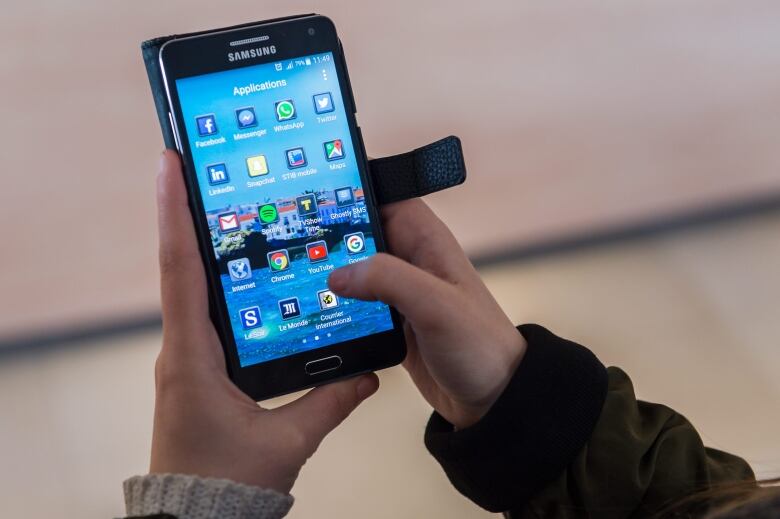Researchers look at how brain power is affected by digital technologies
'Cognitive offloading' frees up brain power, but long-term effects are still unclear, according to new review

This probably sounds familiar you book an appointment, make an entryon your smartphone, and completely forget about it until the alert reminds you the day before.
But how much is our reliance on smartphonesas memory aides affecting the way our brains work?
CBC Radio science columnist Torah Kachurhas looked into a new Canadian review of the benefits, and costs, of these daily "information offloads."
What does the latest research review look at?
Two psychologists from the University of WaterlooEvan Risko and Sam Gilbertlooked at the research that has been done in the field of "cognitive offloading," in a newreview publishedin the journal Trends in Cognitive Sciences.
Cognitive offloading is basicallythe idea that you can assign the duties of your brain power onto a device, to save your brain space.
The researcherswanted to look at two facets in the fieldwhat triggers this behaviour, and what the measurable consequences might be.
They foundthe research suggeststhis cognitive offloading can be both good, and potentially bad, for our brains.
Why is writing down informationgood for our brains?
Whenwe write something down, our brains aren't bogged down with trying to remember what we need for groceriesor the time ofthe dentist appointment.Instead, our brainis free to do more relevant and complex tasks like pondering the meaning of life.

And it's not just smartphones that allow us to do this cognitive offloading it could also be anything fromcounting with our fingers, using a calculator for simple arithmetic, writing down the grocery list, or even the simple act of tilting our heads to make angled text easier to read.All of these processesallowus to dedicate our brains to the hard stuff.
Is cognitive offloading via smartphones a problem?
That's actually not something we have an answer to quite yet, because the long-term studies just haven't been done.
- 'Digital amnesia' leaves us vulnerable, survey suggests
- Smartphone-touchscreen use altering brain activity
We do know that cognitive offloading definitely affects short-term memory. Evan Risko,the co-author of the new research review,points to a 2013 study that looked at another smart technology that changes the way we use memory the digital camera.

"The argument was that this notion of taking a picture is a form of offloading," Rasko said.
"The object that you'relooking at is now semi-permanently stored in some external medium, so maybe I don't need to expend the cognitive resources to encode that object in memory."
How much has technology decreased what we actually remember?
That's hard to say, but themore we offload, the less we remember. And it's a "use it or lose it" scenario with your brain.
So if you put a note into your phone, take a picture of something so that you won't forget it, or write something down and then promptly plunk yourself in front of the TV,that offloading is not doing you any good.
But if you put the task of remembering aside so that you can go about your work of being a rocket scientist, it's a very good thing sinceyou can now dedicate allyour brain power to this complex cognitive task.
Should we be concerned about usingsmartphones to remember things?
Probably not. The reality is that it does free up cognitive realestate in our brains, and we can focus on more complex tasks like thinking about our financial plan, or where our next vacation will be, or whatever else you deem important in your life.
Risko has a good reminder for people worried about the effect of smartphones on our brain power.

"There wasa lot of concern...about whether this would ruin our memories. Because the ability to write things down and read it in a book, you don't have to store it all in mind as people used to."
Needless to say, the act of writing has definitely helped us all not miss appointments and remember whatto get at the grocery store and we have not had a major decline in brain power in the last several hundred years.
That being said, if you're generally someone who isn't challenged cognitively by thinking about deeper problems or complex tasks, then maybe training your brain with a to-do list every now and then would be good for brain health.












_(720p).jpg)


 OFFICIAL HD MUSIC VIDEO.jpg)
.jpg)



























































































